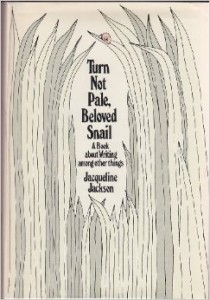

What: Turn Not Pale, Beloved Snail is a writing book aimed at children. Jackson is an experienced YA adult writer, but this is less about writing for children than it is about being a kid who likes to write.
Who: While this is a great book for the nascent writer in your family, any writer will benefit from Jackson’s insight into what hooks a reader as well as her examinations of her own work.
Why: This book is full of joy in writing, a spirit so strong it can’t help but inform your own.
When: Read this with your kids if they’re thinking about writing. Or read it if you’re thinking about writing something aimed at kids and want to remind yourself what the reading experience is like for them.
Where and how: Read with a pen in hand, if only to jot down the many fiction recommendations Jackson makes (or if you forget, they’re all collected in an appendix.) It’s a reading list that shaped my own middle-grade reading, leading me to L.M. Boston and Tove Jansson, among others. Try the exercises as you go.
...
Want access to a lively community of writers and readers, free writing classes, co-working sessions, special speakers, weekly writing games, random pictures and MORE for as little as $2? Check out Cat’s Patreon campaign.

"(On the writing F&SF workshop) Wanted to crow and say thanks: the first story I wrote after taking your class was my very first sale. Coincidence? nah….thanks so much."

(science fiction, short story) Because mermaids lay eggs, hundreds at a time, at least that kind did. And the natural-born ones, they didn’t have human minds guiding them. They were like sharks—they ate, they killed, they ate. Most of the original human mermaids had gotten out when they found out that the seas were full of chemicals, or that instead of whale songs down there, they heard submarine sonar and boat signals. When the last few found out that they were spawning whether they liked it or not, they got out too. Supposedly one or two stayed, and now they live in the sea with their children, twice as mean as any of them.


This site is protected by reCAPTCHA and the Google Privacy Policy and Terms of Service apply. This site is a participant in the Amazon Services LLC Associates Program, an affiliate advertising program designed to provide a means for sites to earn advertising fees by advertising and linking to Amazon.com.